This article brings you relevant knowledge about Oracle, which mainly introduces the issues related to checking locks and sql in session execution. Let’s take a look at it together. I hope it will be helpful to everyone. .

Recommended tutorial: "Oracle Video Tutorial"
The database environment for the test data in this article: Oracle 11g
Why is it said that it is the sql during session execution? It seems that the sql execution record of a certain session cannot be obtained. I have also read a lot of blog posts. Many people on the Internet say that the sql_id is associated with the view v$active_session_history and v$sqlarea. You can query the sql execution record of a certain session. After practice, it is found that it does not work (tried through the table dba_hist_active_sess_history also does not work) , the sql_id of some sql is not recorded at all in v$active_session_history, I Try to modify the parameters: control_management_pack_access, and found that I do not have permission. I checked it and found that the parameter value is normal and the parameter database is open. Refer to the blog post: Oracle V$ACTIVE_SESSION_HISTORY Query No Data - wazz_s - Blog Park
I can query the execution record of SQL through the v$sqlarea view, but I cannot find the sessionid that executed the SQL. It would be great if I had this sessionid, so that I can find out who executed the SQL. .
If I want to query the sql that caused the table to be locked, most of the blog posts on the Internet teach this. Get the corresponding prev_sql_addr field value by querying the view v$session, which is recorded as Value A, and then use value A as the query condition value of the view v$sqlarea field address, and then the corresponding SQL record can be queried. As a practice test, you can find the SQL that finds the lock table, but in most cases you cannot get it in a normal production environment. Why? Please see the introduction below.
This article uses an exploratory approach to study. In order to ensure the accuracy of the data, I opened three database sessions, recorded as session1, session2, and session3 respectively. The specific steps are as follows:
1 Create a new test table and test data in session session1
--新建测试表 create table zxy_table(zxy_id int,zxy_name varchar2(20)); --插入数据 insert into zxy_table(zxy_id,zxy_name) values(1,'zxy1'); insert into zxy_table(zxy_id,zxy_name) values(2,'zxy2'); insert into zxy_table(zxy_id,zxy_name) values(3,'zxy3'); insert into zxy_table(zxy_id,zxy_name) values(4,'zxy4'); commit;
2 View the session ID of session1
select userenv('sid') from dual;

You can see that the session ID is 2546
3 In session1, lock a row of the table zxy_table through select for update, as follows:
select * from zxy_table where zxy_name='zxy1' for update;
4 In session2, query that the session ID is 2189:

Then update the row in the table zxy_table with the value zxy_name='zxy1' in session2, as follows:
update zxy_table set zxy_name='zxy1_modify' where zxy_name='zxy1';
Then we saw that the sql has been blocked, as shown below:

5 Then we came to session 3 to view the lock table situation
First check the table v$locked_object
select * from v$locked_object;

You can see that the session id that caused the lock table is 2546, which is the previous session1, and the object_id is 110154. Of course, In the generation environment, you will definitely see more than one record. You have to execute it several times. After executing it n times, you can still see the record, which proves that this record is the record of the lock table.
Pass object_id :110154 Query the dba4_objects table to query the detailed lock table information
select object_name as 被锁的表名称,obj.* from dba_objects obj where object_id='110154';

select s.prev_sql_addr, module as 客户端工具名称, s.user# as 数据库账号名, s.osuser as 连接数据库客户端对应的window账号名称, s.machine as 连接数据库客户端对应的计算机名称, s.* from v$session s where sid='2546';# through sessionid: 2546
 ## Get the value of prev_sql_addr: 000000012E045E28, and then query the view v$sqlarea through the obtained value
## Get the value of prev_sql_addr: 000000012E045E28, and then query the view v$sqlarea through the obtained value
select * from v$sqlarea where address='000000012E045E28';
 As you can see from the picture above, the result There is a statement to lock the table, but many blog posts are finished at this step. Is this query really reliable? The answer is unreliable. You can go back to session1 and execute a sql at will, as follows:
As you can see from the picture above, the result There is a statement to lock the table, but many blog posts are finished at this step. Is this query really reliable? The answer is unreliable. You can go back to session1 and execute a sql at will, as follows:
select * from zxy_table;
Then you can go to session3 to execute
select s.prev_sql_addr, module as 客户端工具名称, s.user# as 数据库账号名, s.osuser as 连接数据库客户端对应的window账号名称, s.machine as 连接数据库客户端对应的计算机名称, s.* from v$session s where sid='2546';
再看看prev_sql_addr是不是变了,从000000012E045E28变为了00000001FB03CEC0,再通过00000001FB03CEC0查询视图v$sqlarea
select * from v$sqlarea where address='00000001FB03CEC0';

得到的sql_text是select * from zxy_table,你敢说这条sql导致了锁表吗?所有只能说是session1当前执行的sql,而且你很难保证session1执行完锁表的sql: select * from zxy_table where zxy_name='zxy1' for update且在提交前不再执行别的sql,这就是前文提出的问题的答案。
推荐教程:《Oracle视频教程》
The above is the detailed content of oracle view lock and session execution sql (summary sharing). For more information, please follow other related articles on the PHP Chinese website!
 什么是oracle asmApr 18, 2022 pm 04:16 PM
什么是oracle asmApr 18, 2022 pm 04:16 PMoracle asm指的是“自动存储管理”,是一种卷管理器,可自动管理磁盘组并提供有效的数据冗余功能;它是做为单独的Oracle实例实施和部署。asm的优势:1、配置简单、可最大化推动数据库合并的存储资源利用;2、支持BIGFILE文件等。
 oracle怎么查询所有索引May 13, 2022 pm 05:23 PM
oracle怎么查询所有索引May 13, 2022 pm 05:23 PM方法:1、利用“select*from user_indexes where table_name=表名”语句查询表中索引;2、利用“select*from all_indexes where table_name=表名”语句查询所有索引。
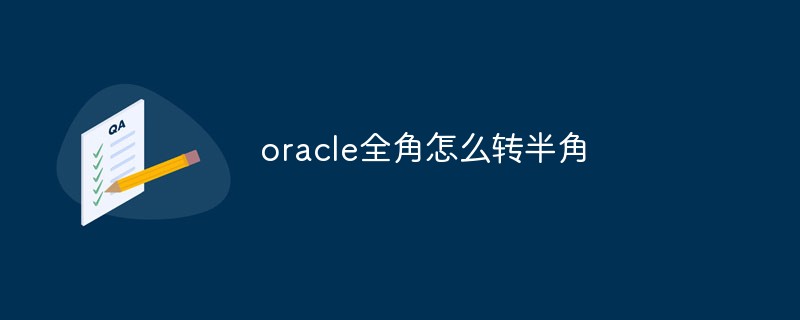 oracle全角怎么转半角May 13, 2022 pm 03:21 PM
oracle全角怎么转半角May 13, 2022 pm 03:21 PM在oracle中,可以利用“TO_SINGLE_BYTE(String)”将全角转换为半角;“TO_SINGLE_BYTE”函数可以将参数中所有多字节字符都替换为等价的单字节字符,只有当数据库字符集同时包含多字节和单字节字符的时候有效。
 Oracle怎么查询端口号May 13, 2022 am 10:10 AM
Oracle怎么查询端口号May 13, 2022 am 10:10 AM在Oracle中,可利用lsnrctl命令查询端口号,该命令是Oracle的监听命令;在启动、关闭或重启oracle监听器之前可使用该命令检查oracle监听器的状态,语法为“lsnrctl status”,结果PORT后的内容就是端口号。
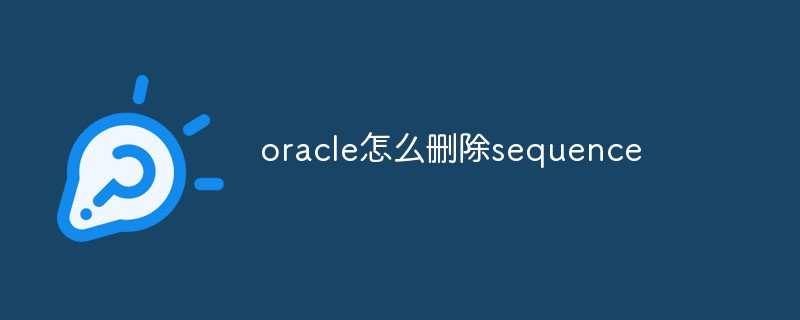 oracle怎么删除sequenceMay 13, 2022 pm 03:35 PM
oracle怎么删除sequenceMay 13, 2022 pm 03:35 PM在oracle中,可以利用“drop sequence sequence名”来删除sequence;sequence是自动增加数字序列的意思,也就是序列号,序列号自动增加不能重置,因此需要利用drop sequence语句来删除序列。
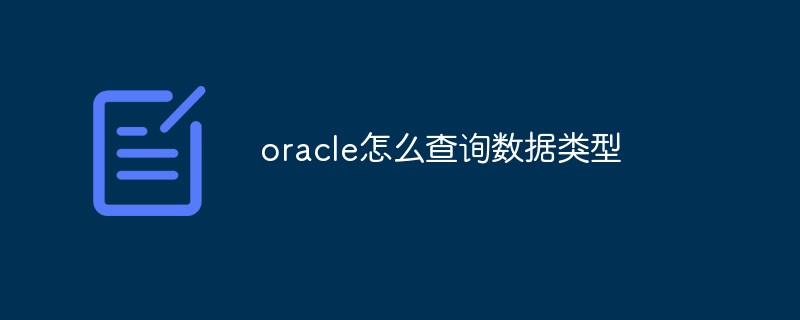 oracle怎么查询数据类型May 13, 2022 pm 04:19 PM
oracle怎么查询数据类型May 13, 2022 pm 04:19 PM在oracle中,可以利用“select ... From all_tab_columns where table_name=upper('表名') AND owner=upper('数据库登录用户名');”语句查询数据库表的数据类型。
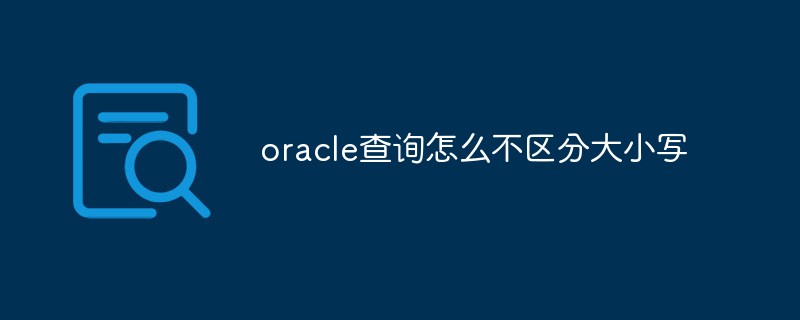 oracle查询怎么不区分大小写May 10, 2022 pm 05:45 PM
oracle查询怎么不区分大小写May 10, 2022 pm 05:45 PM方法:1、利用“LOWER(字段值)”将字段转为小写,或者利用“UPPER(字段值)”将字段转为大写;2、利用“REGEXP_LIKE(字符串,正则表达式,'i')”,当参数设置为“i”时,说明进行匹配不区分大小写。
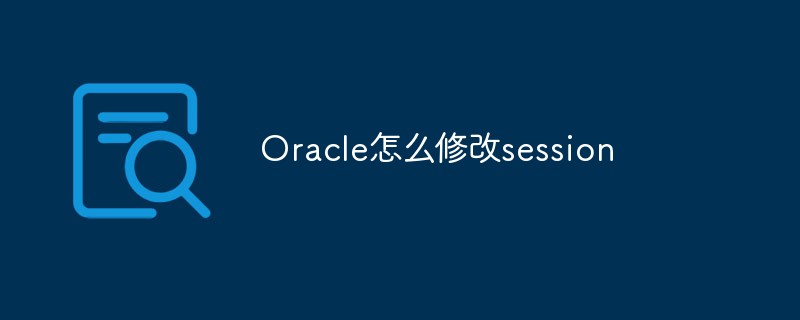 Oracle怎么修改sessionMay 13, 2022 pm 05:06 PM
Oracle怎么修改sessionMay 13, 2022 pm 05:06 PM方法:1、利用“alter system set sessions=修改后的数值 scope=spfile”语句修改session参数;2、修改参数之后利用“shutdown immediate – startup”语句重启服务器即可生效。


Hot AI Tools

Undresser.AI Undress
AI-powered app for creating realistic nude photos

AI Clothes Remover
Online AI tool for removing clothes from photos.

Undress AI Tool
Undress images for free

Clothoff.io
AI clothes remover

AI Hentai Generator
Generate AI Hentai for free.

Hot Article

Hot Tools

SublimeText3 Chinese version
Chinese version, very easy to use

SublimeText3 English version
Recommended: Win version, supports code prompts!

MantisBT
Mantis is an easy-to-deploy web-based defect tracking tool designed to aid in product defect tracking. It requires PHP, MySQL and a web server. Check out our demo and hosting services.

Dreamweaver CS6
Visual web development tools

WebStorm Mac version
Useful JavaScript development tools





